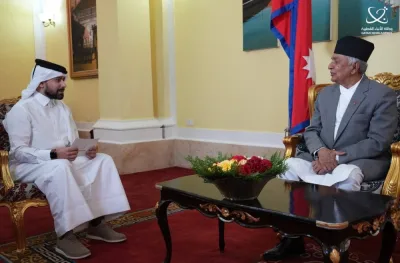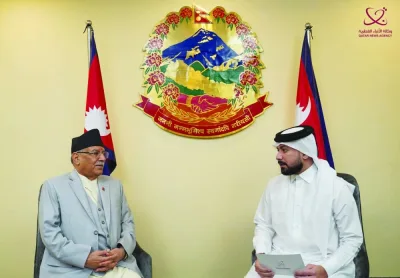Qatar has filed a complaint under a UN anti-racism treaty against two of the countries which have been blockading it for a year.
The Doha government made the move as thousands of its citizens remain cut off from relatives and loved ones 12 months after a Saudi Arabia-led alliance launched a diplomatic and transport boycott.
Many are Qataris living in mixed marriages who were expelled from the blockading countries, in many cases separating them from their spouses and children.
Now a complaint against Saudi Arabia and the United Arab Emirates has been handed in to the UN’s International Convention on the Elimination of Racial Discrimination.
If found to have violated the convention, the UAE could end up being reprimanded by the International Court of Justice.
Article 22
But Saudi Arabia would escape censure because it opted out of article 22 of the convention, which means it can neither take another country to the ICJ, nor be taken to it.
No complaint was made against the other two blockading countries, Bahrain and Egypt.
A spokesperson for the Office of the High Commissioner for Human Rights (OHCHR) said: "We can confirm that the Committee on the Elimination of Racial Discrimination has received an inter-State complaint under article 11 of ICERD from Qatar against Saudi Arabia and the United Arab Emirates."

William Schabas, Professor of International Law at Middlesex University, said: "When you have the mass expulsion of a population with people being removed on the basis of their nationality, ethnicity or race then you’re in the zone, you’re in the territory of the Convention".
The little-known Convention was set up 50 years ago but had only been used recently, first by Georgia and then Ukraine, both against Russia.
In April Palestinian diplomats filed a 350-page complaint to the ICERD accusing Israel of policies and practices that have "the common aim of displacing and replacing the Palestinian people, for the purpose of maintaining a colonial occupation."
There are 178 countries who are signatories to the convention and the Committee on the Elimination of Racial Discrimination, a body of 18 international experts, will assess the complaint.
If the opposing parties cannot be reconciled the matter may then go to the International Court of Justice.
Prof Schabas added: "After the committee, they can take it to the International Court of Justice, which is the world court, and it could make an authoritative ruling that could be very dramatic in an international law sense. It’s big-time shaming. This is something no state would like to happen to it."
Blockade
Last June the Saudi-led alliance launched the blockade accusing Qatar of cosying up to Iran and supporting militants, which Doha denies.
This led to families being separated as Qataris were sent home and Emiratis ordered to return to the UAE under threat of having their citizenship revoked.
The Saudi border with Qatar was closed, in one case preventing four grieving sons from retrieving their father’s body after he died suddenly on a visit to Qatar.
Anyone caught sympathising with Qatar on social media faced immediate detention.
In his report, ‘The Blockade One Year On: Violations of Human Rights and Coercive Measures’, Prof Schabas said: "The measures taken by the Quartet against Qatar have had terrible consequences for family life, causing temporary and possibly permanent disruption to families. These have created huge strains on families in their efforts to cope with displacement and family loss."
Among case studies released this week by Qatar’s National Human Rights Committee included a man prevented from going on pilgrimage to Makkah, a student stopped from finishing his degree in UAE and a disabled child and father suffering from life-threatening condition unable to continue their treatment in Saudi Arabia.
Prof Schabas added: "I can’t predict how long the blockade will last because I’m not a politician. But what I can predict is that human rights violations will continue until it’s resolved and the impact will be felt often in many small and seemingly insignificant ways, but nevertheless they are part of this bigger problem, of the illegality of the blockade and what it does to a region that already has its share of political problems."
Many are Qataris living in mixed marriages who were expelled from the blockading countries, in many cases separating them from their spouses and children.
Now a complaint against Saudi Arabia and the United Arab Emirates has been handed in to the UN’s International Convention on the Elimination of Racial Discrimination.
If found to have violated the convention, the UAE could end up being reprimanded by the International Court of Justice.
Article 22
But Saudi Arabia would escape censure because it opted out of article 22 of the convention, which means it can neither take another country to the ICJ, nor be taken to it.
No complaint was made against the other two blockading countries, Bahrain and Egypt.
A spokesperson for the Office of the High Commissioner for Human Rights (OHCHR) said: "We can confirm that the Committee on the Elimination of Racial Discrimination has received an inter-State complaint under article 11 of ICERD from Qatar against Saudi Arabia and the United Arab Emirates."

William Schabas, Professor of International Law at Middlesex University, said: "When you have the mass expulsion of a population with people being removed on the basis of their nationality, ethnicity or race then you’re in the zone, you’re in the territory of the Convention".
The little-known Convention was set up 50 years ago but had only been used recently, first by Georgia and then Ukraine, both against Russia.
In April Palestinian diplomats filed a 350-page complaint to the ICERD accusing Israel of policies and practices that have "the common aim of displacing and replacing the Palestinian people, for the purpose of maintaining a colonial occupation."
There are 178 countries who are signatories to the convention and the Committee on the Elimination of Racial Discrimination, a body of 18 international experts, will assess the complaint.
If the opposing parties cannot be reconciled the matter may then go to the International Court of Justice.
Prof Schabas added: "After the committee, they can take it to the International Court of Justice, which is the world court, and it could make an authoritative ruling that could be very dramatic in an international law sense. It’s big-time shaming. This is something no state would like to happen to it."
Blockade
Last June the Saudi-led alliance launched the blockade accusing Qatar of cosying up to Iran and supporting militants, which Doha denies.
This led to families being separated as Qataris were sent home and Emiratis ordered to return to the UAE under threat of having their citizenship revoked.
The Saudi border with Qatar was closed, in one case preventing four grieving sons from retrieving their father’s body after he died suddenly on a visit to Qatar.
Anyone caught sympathising with Qatar on social media faced immediate detention.
In his report, ‘The Blockade One Year On: Violations of Human Rights and Coercive Measures’, Prof Schabas said: "The measures taken by the Quartet against Qatar have had terrible consequences for family life, causing temporary and possibly permanent disruption to families. These have created huge strains on families in their efforts to cope with displacement and family loss."
Among case studies released this week by Qatar’s National Human Rights Committee included a man prevented from going on pilgrimage to Makkah, a student stopped from finishing his degree in UAE and a disabled child and father suffering from life-threatening condition unable to continue their treatment in Saudi Arabia.
Prof Schabas added: "I can’t predict how long the blockade will last because I’m not a politician. But what I can predict is that human rights violations will continue until it’s resolved and the impact will be felt often in many small and seemingly insignificant ways, but nevertheless they are part of this bigger problem, of the illegality of the blockade and what it does to a region that already has its share of political problems."



